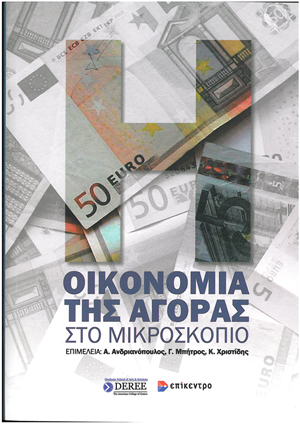Anastasia Balezdrova
The fact that the proponents of state intervention in all spheres of public life in Greece are immeasurably more than the opponents of this idea is undeniable. The difficulties in implementing even minimal reforms and mostly the inability and unwillingness of the government to decisively reduce the number of un-needed public servants are just part of the proof of this.
Six years after the worst economic crisis in the country since its return to democracy, liberal ideas are still foreign to most Greeks. Market liberalization, privatization of state-owned enterprises and a reduction of the over large public sector are rejected by the vast majority of society, whether in elections people vote for leftist or rightist parties.
What has caused this? Three of the authors of the newly published book, The market economy under the microscope, gave an answer to this question during its presentation at the Institute of Diplomacy and Global Affairs at the American College in Athens. 
The back cover of the book reads: "... In Greece, heaps of left-oriented economic and political analyses have been printed, written by more or less important authors. The books analyzing the functions and the advantages of a market economy, however, are very few. It is indicative that the works of the most important economists and theorists of liberalism such as Hayek and Friedman have been translated and published in Greek after a delay of 45 years".
According to honorary professor of economics at the Athens University of Economics George Bitros, there are three main reasons. "The first reason is that for so many years, not even one charismatic political leader in Greece has appeared to implement policies based on these ideas". Bitros said that he believed the only Greek prime minister, who had tried and to some extent applied, liberal policies in some sectors was Konstantinos Mitsotakis.
The second reason which the economist pointed out was the paradox that business representatives who would have the greatest interest in the introduction of liberalism into the economy were its greatest enemies. He said: "I am speaking, for example, of the Association of Greek Industrialists. They oppose the liberalization of the market and protect the state-imposed regulations in order to prevent the coming of new players - even the Institute for Industrial Research which they established is continuously headed by admirers of state intervention in private business".
The third reason according to the economist is the issue of education. "Schools and universities are filled with teachers and lecturers - advocates of the doctrine that the state should intervene directly in economic and social life. Even private education in Greece is essentially a state education. Thus, in the minds of citizens the understanding is formed that this is the right way of development from a very early age. Under these conditions, it is hard for liberal ideas to find a place afterwards".
But despite these key obstacles to the spread of liberal ideas, Bitros said he was optimistic regarding their implementation in Greece, "as this is the only way for the country to emerge from the crisis. This process takes place very slowly and with difficulties, but at some point it will give results, especially under the pressure from the representatives of creditors", he said.
According to lawyer Costas Christidis reforms in Greece will continue to be implemented with considerable difficulty due to the strong political and public resistance. In his words, in order for change to be triggered, a radical change in the functioning of institutions is necessary, which implies changes in leadership.
“When they are abroad Greeks follow the rules and act accordingly. Their behaviour is quite different from what they show when they are in Greece. What is different abroad? Functioning institutions. Therefore I consider that the change should start with them, especially from the political leadership”.
In the opinion of lawyer Thasos Avrantinis Greek politicians have largely acted as intermediaries for the advancement of the interests of different professional groups. "As we see these days, the resistance is most serious among appointees under political patronage. They are decisively against their job being evaluated and have the support of some of the mayors and even of the regional governor in Attica, who refuse to submit the data of the Ministry of Administrative Reform".
Yet, according to Avrantinis in recent years some liberal ideas have been implemented, while others find their place in legislation passed in parliament. "The problem in Greece, however, continues to be the implementation of reforms. Adoption of laws is not enough", he added.
The three authors of the book expressed optimism that the exit from the economic crisis will be what will impose so far unpopular liberal ideas in Greece.